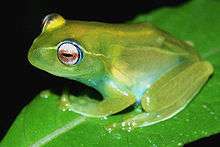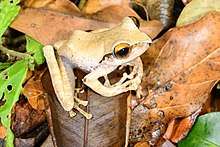Boophis
Boophis is the only genus in the mantellid frog subfamily Boophinae. They are commonly known as bright-eyed or skeleton frogs. They show typical 'tree frog' traits, and are a good example of convergent evolution with morphologically similar species in the families Hylidae and Rhacophoridae, among others. This genus can only be found on Madagascar and Mayotte Island (Comoros).[1]
| Bright-eyed frogs | |
|---|---|
 | |
| Boophis ankaratra | |
| Scientific classification | |
| Kingdom: | Animalia |
| Phylum: | Chordata |
| Class: | Amphibia |
| Order: | Anura |
| Family: | Mantellidae |
| Subfamily: | Boophinae Vences & Glaw, 2001 |
| Genus: | Boophis Tschudi, 1838 |
| Type species | |
| Boophis goudotii Tschudi, 1838 | |
| Diversity | |
| 79 species | |
| Synonyms | |
| |
_juvenile%2C_Montagne_d%E2%80%99Ambre.jpg)
Montagne d'Ambre

Taxonomy
The genus Boophis was described by Johann Jakob von Tschudi in 1838.[2] It was originally considered a member of the African-Asian family Rhacophoridae, but was moved to the family Mantellidae in 2001,[3] into its own subfamily, Boophinae Vences & Glaw, 2001.
Morphology
Boophis are arboreal frogs, exhibiting many traits that define 'tree frogs', such as expanded toe discs, long hindlimbs, and large eyes.[1] Boophis are especially characterised by bright colouration of the iris, which is typically intricately patterned towards its inside, and often green or blue, but occasionally also red, purple, or yellow in the outer iris area.[1] This has led to the vernacular name of bright-eyed frogs for the genus. Many species of Boophis have almost translucent skin, allowing bones and internal organs to be observed as in the unrelated glass frogs (Centrolenidae) of the tropical Americas.[4] This has led to the vernacular name skeleton frogs for some members of the genus.
Species
The genus has presently nearly 80 species; new ones are being described every few months on average. This list may not be exhaustive.
|
|
References
- Glaw, Frank; Vences, Miguel (2007). A Field Guide to the Amphibians and Reptiles of Madagascar (3rd ed.). Cologne, Germany: Vences & Glaw Verlags. ISBN 978-3929449037.
- Tschudi, J. J. v. (1838). Classification der Batrachier mit Berücksichtigung der fossilen Thiere dieser Abtheilung der Reptilien. Neuchâtel: Petitpierre.
- Vences, Miguel; Glaw, Frank (2001). "When molecules claim for taxonomic changes: New proposals on the classification of Old World treefrogs". Spixiana. 24 (1): 85–92.
- Hutter, Carl; Lambert, Shea M.; Andriampenomanana, Zo F.; Glaw, Frank; Vences, Miguel (2018-10-01). "Molecular phylogeny and diversification of Malagasy bright-eyed tree frogs (Mantellidae: Boophis)". Molecular Phylogenetics and Evolution. 127: 568–578. doi:10.1016/j.ympev.2018.05.027. ISSN 1055-7903. PMID 29894731.
| Wikimedia Commons has media related to Boophis. |
